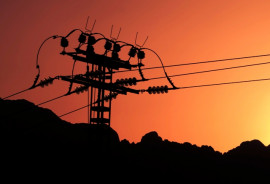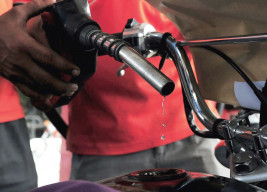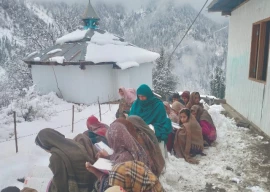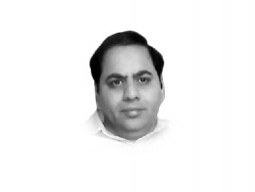
The Competition Commission of Pakistan (CCP) imposed a Rs50 million fine on 1-Link Guarantee Limited and Rs50 million each on its 11 founding member banks and Rs10 million on each of its 17 non-founding member banks for imposing uniform customer charges for using ATMs of other banks in violation of the Competition Act 2010, according to the CCP.
Citibank has not been charged as it did not follow the practice of charging customers of other banks, says the statement.
The bench also observed that despite the financial liberalisation and deregulation measures of the banking sector, the efficiency of the industry is far below the banking sector of some of the developed countries and even the banking sector of countries like India and Bangladesh. The banking spread – gap between lending and borrowing – in Pakistan is currently at 8.12% while India and Bangladesh have a better rate of 0.92% and 5.90%, respectively.
The order was passed by a CCP bench comprising its Chairperson Rahat Kaunain Hassan and members Abdul Ghaffar and Dr Joseph Wilson in respect of the proceedings initiated against 1-Link and its member banks for imposing uniform customer charges.
It has imposed Rs50 million penalty on each founding member including National Bank of Pakistan, Allied Bank, Habib Bank, Bank Al-Falah, Askari Bank, Soneri Bank, NIB Bank, United Bank, Standard Chartered Bank Pakistan, Faysal Bank and Bank Al Habib.
The Commission has also imposed Rs10 million fine on each non-founding members, Al Baraka Bank Pakistan, Burj Bank, Meezan Bank, Bank Islami, Khadim Ali Shah Bukhari (KASB) Bank, Habib Metropolitan Bank, The Bank of Khyber, Dubai Islamic Bank Pakistan, JS Bank, Silkbank, The Bank of Punjab, Samba Bank, Sindh Bank, Barclays Bank PLC Pakistan, Tameer Microfinance Bank Limited, Kashf Micro Finance Limited and Summit Bank.
However, the bench has granted exemption to the 1-Link Agreement entered into by and between founding members and Inter Bank Fund Transfer (IBFT) Agreement entered into by and between 1-Link and TPS Pakistan (Private) Limited and ABN AMRO Bank N.V. (now known as Faysal Bank Limited), to the extent of interchange (bank to bank) fee for ATM cash withdrawal and IBFT services and also Utility Bill Payment Services (UBPS) Agreements entered into by 1-Link with utility companies, said the CCP.
The CCP said that in preliminary fact finding it was observed that 1-Link holds 80% of market share in shared ATM network services in Pakistan and is a consortium of 11 major banks that are also represented on its Board of Directors while the other 20 banks are its members.
“1-Link member banks are acting in a collective manner by charging a uniform fee to their customers for Off Us ATM cash withdrawal transactions,” said the CCP in its ruling. The banks which were previously not charging have now joined banks that are charging their customers Rs15 for every transaction.
The collusion among the banks was established from the fact that none of the banks placed any Board decision with respect to passing on Rs15 on its customers.
The CCP said from the documents on record it was established that 1-Link required its member banks to incorporate the decision made in its Board meeting regarding increase of off-us ATM cash withdrawal charges from Rs15 to Rs20. Similarly, 1-Link Committee made recommendation that Rs5 may also be charged to customers for balance inquiry transaction by its member banks.
The CCP said that the 1-Link has assumed the role of front runner acting more as association for banks and doing advocacy on their behalf before the regulator with respect to customer charges.
Published in The Express Tribune, July 3rd, 2012.
COMMENTS (15)
Comments are moderated and generally will be posted if they are on-topic and not abusive.
For more information, please see our Comments FAQ



1730360426-0/Menendez-Brothers-(2)1730360426-0-165x106.webp)



















didnt get you ET.. whats the moral of this story?
@Glenn Ryall: ... In a country where "don't we have a right to indulge in corruption" is the manifesto of the ruling party..
good step against the hidden and violation of contract
After Libor scandal we have to review our banking roles may be some where Kibor has some kind of hidden scandal's. Banking sector should stop promoting trading sector specially after the collapse of Euro zone due to one of the reasons of high frequency trading. Review Banking Policies they are investing of worthless economy based on trading
Its a positive gestures. I really appreciate it.
It is said banks make money out of nothing. Banks are debtors as they owe money to the creditors or depositors.
All the investment made in IT infra-structure developed by the banks has been paid for by the depositors. Banks have identified the Off-Us ATM service as a revenue stream.
Large banks with large customer base can offer a lower rate, say Rs.10 per ATM withdrawal, and still make more money compared to smaller banks having a smaller customer base.
The large banks charging Rs.15/- per ATM transaction is very unfair. The large banks should charge lower than the smaller banks.
Where is the competition among banks? CCP must break the cartel.
Exactly. I don't understand these stupid rules. They should pay the money back to the customers.
In a country where from the sabzi wala to the public transporters rob you to the skin, the banks also have a right :p
Will i get my money back which I paid numerous times while withdrawing money from ATM?
When it comes to services and facilities being provided by the bank to its customer then the poorest in this cadre is NBP, if you find sometime its ATM working then it may be deemed as blessing, the laziest staff of all the banks are working here and you can't dream of any modern day banking facility here. In my opinion banks should also be ranked based on the services and facilities being provided to the customers, profit sharing criteria and customers' satisfaction level
I couldn't get the point; what's gonna happen now:
"were they charging undue amount from customer?" "are they now discontinuing this fee from 1-Link all across?" "or banks were supposed to submit this collection to any governing body & were not doing so?" and above all; "is it going like that from now onwards, as well?"
Why the practice was allowed to continue for years?
Why don't the state bank and regulatory authority do anything to bring down the spread in line with that of India and Bangladesh? Why have they given the banks a free hand to loot their customers?
Will the customers get any benefit from this case? Or will the ATM charges be doubled to recover this fine?
They will get away with that by paying 385 million (half the amount) in bribes.